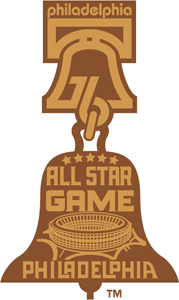 | ||||||||||||||||||||||||||||||||||||||||
| ||||||||||||||||||||||||||||||||||||||||
| Date | July 13, 1976 [1] [2] | |||||||||||||||||||||||||||||||||||||||
|---|---|---|---|---|---|---|---|---|---|---|---|---|---|---|---|---|---|---|---|---|---|---|---|---|---|---|---|---|---|---|---|---|---|---|---|---|---|---|---|---|
| Venue | Veterans Stadium [1] [2] | |||||||||||||||||||||||||||||||||||||||
| City | Philadelphia, Pennsylvania | |||||||||||||||||||||||||||||||||||||||
| Managers |
| |||||||||||||||||||||||||||||||||||||||
| MVP | George Foster (CIN [2] ) | |||||||||||||||||||||||||||||||||||||||
| Attendance | 63,974 [1] [2] | |||||||||||||||||||||||||||||||||||||||
| Ceremonial first pitch | President Gerald Ford [2] | |||||||||||||||||||||||||||||||||||||||
| Television | ABC | |||||||||||||||||||||||||||||||||||||||
| TV announcers | Bob Prince, Warner Wolf and Bob Uecker | |||||||||||||||||||||||||||||||||||||||
| Radio | CBS | |||||||||||||||||||||||||||||||||||||||
| Radio announcers | Jack Buck, Brent Musburger and Andy Musser | |||||||||||||||||||||||||||||||||||||||
The 1976 Major League Baseball All-Star Game was the 47th midseason exhibition between the all-stars of the American League (AL) and the National League (NL), the two leagues comprising Major League Baseball. The game was played on July 13, 1976, at Veterans Stadium in Philadelphia, Pennsylvania, home of the Philadelphia Phillies of the National League. The game resulted in a 7–1 victory for the NL.
Contents
- American League roster
- Elected starters
- Pitchers
- Reserve position players
- Coaching staff
- National League roster
- Elected starters 2
- Pitchers 2
- Reserve position players 2
- Coaching staff 2
- Starting lineups
- Umpires
- Scoring summary
- Line score
- Game notes and records
- References
- External links
This was the third time that the All-Star Game had been played in Philadelphia, though the first to be played in Veteran's Stadium. Both the 1943 and 1952 games were played in Philadelphia's Shibe Park with the then Philadelphia Athletics hosting in 1943 and the Phillies hosting in 1952. The All-Star Game would return to Veterans Stadium in 1996.
The game was held to celebrate the 200th anniversary of the Signing of the United States Declaration of Independence. The 2026 Major League Baseball All-Star Game is also scheduled to be in Philadelphia to mark the 250th anniversary.
The honorary captains were Robin Roberts (for the NL) and Bob Lemon (for the AL). [2]
Starting with this All-Star Game, both "O Canada" and "The Star-Spangled Banner" would be sung as part of the annual pregame ceremonies.
